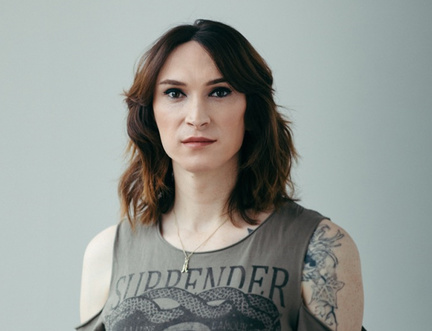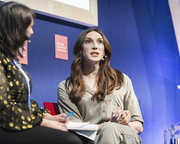Freedom of Speech is not Freedom from Consequence
By Juno Dawson

In 2018, we commissioned 51 authors from 25 countries to write essays exploring ideas about freedom for The Freedom Papers, a publication produced in partnership with Gutter Magazine. Read on for Juno Dawson's essay, and visit guttermag.co.uk to purchase a copy of The Freedom Papers.
‘It’s not transphobic to have concerns about transgender people,’ say various users of Mumsnet, outwardly liberal columnists, some politicians, and certain bigots who attempt to slide a wedge between trans women and feminism.
Hold up. What do they think the word ‘transphobia’ means?
If we swap the word concerns for fears it is textbook definition transphobia.
Of course that’s linguistic gymnastics. I guess you’re either prejudiced or not. Prejudice is so much more than a word: it’s a gut-deep, gurgling suspicion or malice towards a person or a group. These prejudices are perhaps based on nothing; on experience; on tradition; on tabloid rumours. Whatever the origin, taking that prejudice and applying it to countless, nameless people is a phobia. If you have ‘concerns’ about a whole bunch of transgender people, the vast majority of whom you don’t know and have never met, you are transphobic.
If you have met me and you still think I’m a cunt, that’s fine, I guess.
Amongst a litany of things transgender people are baselessly accused of, we are often told we are ‘silencing’ our critics. If only I could, they’re so fucking noisy – it’s half my Twitter feed, honestly. Ah yes, the refrain of bigots everywhere: ‘what about FREEDOM OF SPEECH?’
I always feel this is the last resort. When you have nothing left, it’s the crossed fingers behind your back or the ‘gotcha’ moment on a hidden camera show. One can rationally expose prejudice and discrimination, you can fall back on laws and legislation, but…oh wait, what’s that? ‘Freedom of speech’, you say. Oh great, I guess you win then? You got to speak.
Of course, debates around freedom of speech often lead to a brand of sixth form debate team mental yoga in which, if we silence homophobia, islamophobia, transphobia and racism, we risk villainous despots using those rules to similarly restrict political prisoners, amnesty, protesters and, heaven forbid, trans columnists from having a voice. That’s a valid point, and the reason why laws and legislation around freedom of speech should be closely monitored by both organisations like Amnesty, the UN, and governments. Restricting hate speech is clearly defined and set out in law: you cannot incite violence against those with ‘protected’ status. That includes transgender people because we are especially vulnerable to violence and harassment.
On a personal level, this means you, broadly speaking, have the right to say whatever half-arsed thought pops into your head. What no-one has the legal or moral right to is freedom of consequence. Such a thing does not exist. If you say outrageous things which promote violence, such as revealing the address, schools or workplaces of trans people, you can and should expect to feel the long arm of the law. This is letting violent bigots know where to find their victims. If you’re caught on camera speaking at foam-at-the-mouth rallies in which you advocate violence against trans women, expect to get a knock at the door from a police officer.
Another, and perhaps more likely, consequence of publically spouting off about trans people is you might find some theatres, universities and other arts spaces start to withdraw their offers of hosting you as a speaker. This has become known as ‘no-platforming’. Yes, this is a consequence of your words. If your words are unappealing, you can’t blame people for finding you unappealing. This is true especially if hosting a bigot is going to bring about consequences for the venue or organisation as a whole. Why would a space or company wish to associate itself with ass-backwards, hateful views?
It bears repeating: freedom of speech never came with a guaranteed booking at a university or literary festival. You have no right to a platform. It is the platform’s freedom of speech to say ‘no’.
Social media is one such platform. They too have the right and freedom to decide who gets to use them. Again, no-one ever said that your freedom of speech included the right to go into someone else’s home (in this case an online home) and say utterly abhorrent shit. If someone came into my house and started saying ghastly, prejudiced things, I would ask them to leave. Mark Zuckerberg and Jack Dorsey, among others, created these platforms. They do not ‘belong’ to us, as has been made abundantly clear in the way our data has been harvested from these sites.
For me, a trans woman living in the UK, this isn’t just about my freedom of speech, it’s about my freedom, full-stop. ‘We’re being silenced,’ whine people who advocate the restriction of my actual movements; my access to medical care; my ability to possess a birth certificate; my right to simply exist in my skin. But it’s not true. No-one is sliding a gag over their mouths. Instead, it’s just that some people are saying, ‘you can’t say that shit here’ or ‘you’re a bigot’ and that is very different. That’s our freedom of speech.
And I am absolutely free to say that I think you’re transphobic.
Copyright © 2018, Juno Dawson. All rights reserved.
Supported by the Scottish Government’s Edinburgh Festivals Expo Fund through Creative Scotland.





 Major new partnership with Celtic Connections
Major new partnership with Celtic Connections 

